Best of India Tours
- Golden Triangle Tour- Best of India & Nepal
- Classical Rajasthan
India Cultural Tours
- Images of North India- Karnataka Heritage
- Rajasthan & Goa Tour
Discover India Tours
- Grand India Tour- North to South India
- Central to South India
Rajasthan Tours
- Classical Rajasthan Tour- Golden Triangle Tour
- Grand Mughal Tour
India Luxury Trains
- Palace on Wheels- The Golden Chariot
- India Deccan Odyssey
- The Indian Maharaja
- Royal Rajasthan on Wheels
Nepal Tours
- Glimpses of Nepal- Buddhist Pilgrimage
- Nepal River Rafting
- Destinations of Nepal
- Nepal General Info
India Wildlife Tours
- North India Wild Life- South India Wildlife
Tibet Tours
- Tibet Monastery Tours- Explore Tibet
- Destinations of Tibet
Spa & Yoga Tours
- Ananda in Himalayas- Yoga & Meditation
Adventure Tours
- Manali Safari Tour- Himalayan Trekking
- Horse Safari
Bharatpur
Ajmer
![]() Alwar
Alwar
![]() Bharatpur
Bharatpur
![]() Bijaipur
Bijaipur
![]() Bikaner
Bikaner
![]() Bissau
Bissau
![]() Bundi
Bundi
![]() Deogarh
Deogarh
![]() Jaipur
Jaipur
![]() Jaisalmer
Jaisalmer
![]() Jalore
Jalore
![]() Jodhpur
Jodhpur
![]() Kota
Kota
![]() Mount Abu
Mount Abu
![]() Pushkar
Pushkar
![]() Ranthambore
Ranthambore
![]() Sariska
Sariska
![]() Shekhawati
Shekhawati
![]() Udaipur
Udaipur
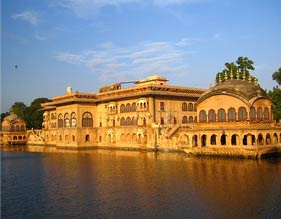
Each year before the advent of winter in the northern hemisphere thousands of birds wing their way across the frozen waters of Siberia, Mongolia, Tibet and the high reaches of eastern Europe to the warmer subcontinent of India. One of the choicest destinations for these avians is the marsh of Bharatpur lying between the cities of Agra and Jaipur in the north-west. The protected marsh, woodland and scrub area of about 29 square kilometres is now known as the Keoladeo Ghana National Park. The sanctuary derived the first part of its name (Keoladeo) from a temple Bharatpur dedicated to Lord Shiva situated in the central zone of the park.
The other part (Ghana) of the name is a Hindi word denoting dense and thick forests.The sanctuary was established by the Maharaja of Bharatpur in 1890 purely for the purpose of creating an exclusive royal game. A large area of the forests were enclosed with embankments and earthen dams called bunds. This led to the creation of a number of lakes and marshes and it proved godsend for the migratory birds from Siberia and other parts of the world. Poaching was banned by the government in 1965 and large-scale conservation efforts began by famous ornithologist Dr. Salim Ali led the sanctuary to be declared as a National Park in March 1982. The sanctuary was accepted as a World Heritage Site by UNESCO in 1985.
Sightseeing
The Keoladeo Ghana National Park is home to an astonishing range of flora and fauna. Birds come to this national park in waves. From August through November, it is indigenous water birds. In early October the first migrants arrive from the high plateaux of Central Asia, Mongolia and Siberia, the most eagerly awaited of the lot being the gravely threatened Siberian crane. The month of March sees most of these migrants leave the national park. But animals that have made it their home—the nilgai (blue bull), sambar, jungle cat and mongoose—spend the entire summer here. A bike or rickshaw ride through the length and breath of this sanctuary is an unforgettable experience. Most parts of the sanctuary can be reached by using bicycles or rickshaws that can be hired from the office of wildlife authorities situated at the main gate. Binoculars and English-speaking trained guides can also be hired to increase your chances of sighting a Siberian crane, the most famous of its migratory guests.
Excursions
While on a trip to Bharatpur, do take some time off to visit the nearby places like Alwar, Deeg, Mahaban, Barsana, Dholpur, and Nandgaon which are quite popular among tourists. The Bharatpur-Deeg-Dholpur circuit covers many small and seemingly backward villages that have enjoyed celebrity status once upon a time, playing host to royalty or bearing witness to major battles. Mahwa is a halfway house between Bharatpur and Jaipur at a distance of around 60 km on National Highway 11. Alwar is regarded as the gateway to the colourful state of Rajasthan. Deeg is a princely town which was once used as the summer resort by Maharaja of Bharatpur. The small but famous pilgrimage centre, Govardhan, lies along the narrow spur of hills east of Deeg. South-east of Bharatpur, on the national highway between Agra and Gwalior, lies Dholpur, capital of the former princely state of the same name. Mahaban, Nandgaon, Barsana, and Baldeo are all villages related to childhood stories of Lord Krishna.
Excursions for Bharatpur
Jungle Walk
With almost 377 bird species already spotted at Bharatpur, the place is certainly one of the most inviting bird sanctuaries in the world. You can easily spot between 50 to 100 species in a single day, and if your luck permits, you may even come across a Siberian crane in the winter. In fact, Bharatpur//’s primary claim to fame is that it is one of the only two known wintering haunts of the western race of the rare and graceful Siberian crane. Of course, the birds you see will naturally depend on the habitat you are in—and Bharatpur has a variety. The marshy wetlands of the Hansarovar or Mansarovar or Ramband, for instance, are areas where the migratory waterfowl congregate in their thousands.
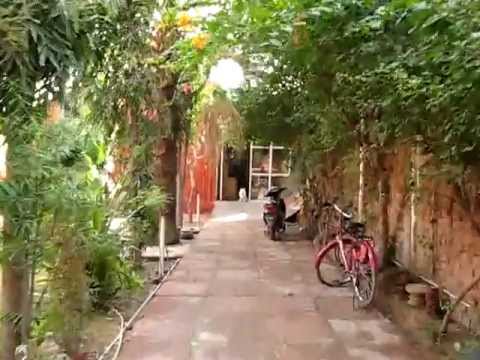
Both the greylag and the bar-headed geese can be found here, often together. The former is somewhat dowdy in its pepper browns and has a pink bill and legs; the latter is smartly turned out in silver-grey, black and white, has an ochre bill and legs, as well as three charcoal //’caste//’ marks across its head. Ducks come in quite a selection: raffish, auburn-headed red-crested pochards wearing black polo necks and vermilion lipstick; more conservatively clad-white-eyed pochards in black Nehru jackets; beady-eyed shovellers (Anas clypeata) floating low and mean, cleaving the water with their patent-leather bills; common teals hiding behind silky green masks; pintails, in chocolate and silver, and mallards with thousand-carat emerald heads.
Of the resident ducks, the cotton teal float demurely around in their simple canvas-like outfits, while the mahogany and honey teals enliven the proceedings with lovely disyllabic whistles as they fly around in disorganized sorties.
Here too stride the waders—some tall enough to pace though the marshes, others light enough to tiptoe over the floating vegetation. The lovely Siberian cranes are of course, the cause celebre of this lot. Equally elegant are the stately grey sarus cranes, a pair often accompanied by a chick who keeps between its parents. There are spoonbills doing their minesweeping act, white ibis looking hunched and rather craven, cattle egrets that take off like blizzards, 250-strong; and everywhere, squeaking, scuttering sandpipers and redshanks, all so confusingly dappled and blotched as they explode from cover and zing away.
The splay-footed purple moorhen look like overweight matrons clad in purple silk, the elegant bronze-winged jacanas show off their metallic tints and the khaki white-tailed lapwings stand tall and upright on reedy yellow legs. A pair of black-necked storks may patrol the middle distances of the marshes, careful to keep apart and, suddenly, a large squadron of common cranes may appear overhead, calling evocatively as they circle and land.
And then, the dangerous shadow of the marsh harrier or fishing eagle passes over this contented congregation. There is a sudden heart-stopping roar of wings over water as some 5,000 ducks take to the sky in tumultuous take-off, the panic spreading though the marsh like a wildlife in a scrub jungle. The birds swarm and circle agitatedly and then sploosh down to a landing once more. You can easily spend the day at the edge of these marshes watching the goings on.
The trees (mainly acacias) that shroud the bunds you walk along also teem with birdlife. Small minivets, in lava, ash and charcoal flicker amidst the greenery, bejewelled kingfishers flash off their perches like short-circuits; red-breasted and grey-headed flycatchers regard you out of round, innocent eyes—the former brown with a flush of orange on its breast (only the male has this), the latter deadly in sulphur and gunpowder. The shrikes eye you suspiciously, their black eyes glittering behind their executioner masks. And a host of dapper wire-tailed swallows may keep you entranced as they dodge deftly between the trees in some hectic game of chase.
The sandy, stony tracts around Python Point, near the Hansarovar, may seem devoid of birdlife except for the odd disgruntled bulbul but the thickets here are the haunts of munias and warblers, and pipits and larks that saunter about on the sand.
The shady woodland areas where the peepuls and kadams soar high and wide, like the lovely stretch along the park//’s eastern boundary wall, are the haunts of shikras (sparrow hawks), tree-creepers, nuthatches and woodpeckers, to mention a few. Another marvelous spot is Kadam Kunj, where an ancient, crumbling hunting lodge squats, surrounded by a moat of black water and crowned by enormous peepul trees, from where the wheezy whistling of green pigeons is interspersed by the crashing, flapping sounds of clumsy nesting vultures.
And wherever you are, it pays to look carefully at the numerous dead trees that dot the landscape for they make favourite perches for many: majestic serpent eagle that use them as vantage points; owls that may peer out of the hollows, their eyes huge and golden; Stealth-bomber-like darters and witch-black cormorants holding their wings out to dry; herons waiting in ambush, and even amorous brahminy mynas! It is also sensible to look up every now and then and see what the sky has to offer. Even the highly areas of the park have their share of birds. At the site of the Keoladeo temple, for instance, white wagtails strut about pompous as landlords amongst the visitors; the blue-throats and redstarts are more circumspect. White-breasted water hens stride officiously from litter bin to litter bin and the jungle babbler will snatch the chips from your hands and then jeer at you rudely.
In this avian kingdom, mammals have also made their home to provide necessary ecological balance. The areas near the Forest Lodge and Forest Resthouse are favourite haunts of jackals and sounders of grunting wild boar. Spotted deer, sambar and nilgai splash about in the marshes, and if you are lucky you may catch a glimpse of that princeling amongst antelopes: the blackbuck. Less visible are fishing cats and monitors. If you are both very quiet and lucky, you may catch sight of the massive gleaming pythons, sunning themselves at Python Point beyond Keoladeo Temple: they are quick to glide underground though, and very sensitive to footfalls and voices. And if snakes are there, can the mongoose be far behind? Well, the nemesis mongoose is also seen here in quite an appreciable number.
Alwar
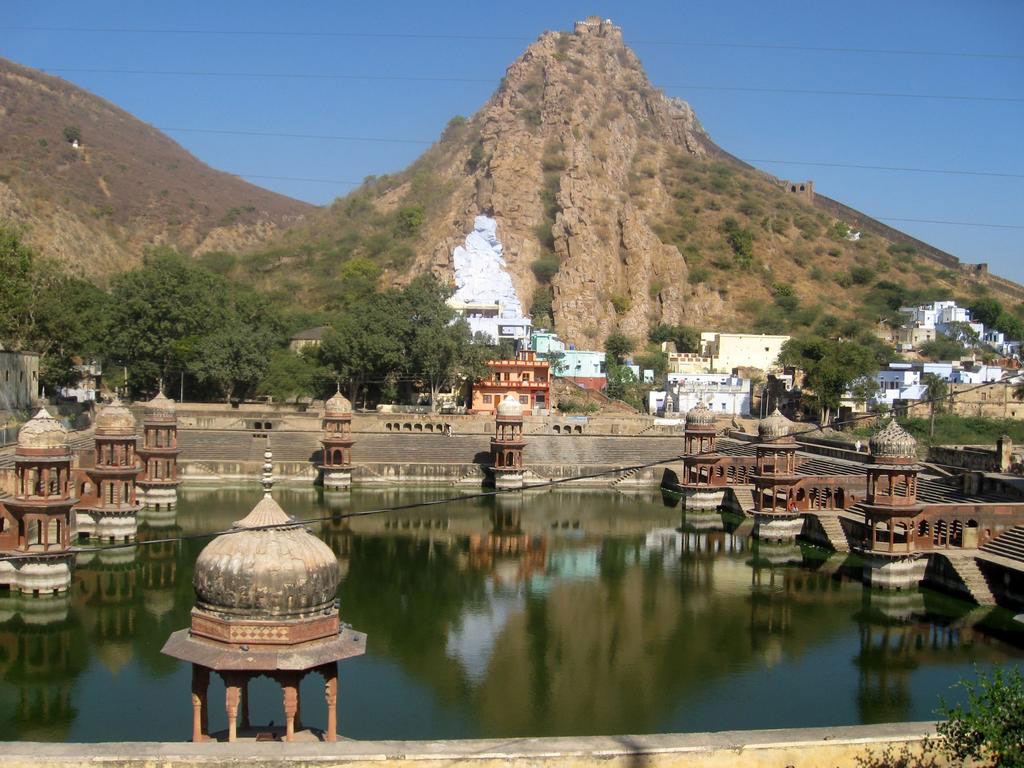
Alwar is at a distance of 116 km from Bharatpur. Though the city is regarded as the gateway to the royal state of Rajasthan, it has a legacy more powerful than that. There are many tourist attractions in the city that reflect the glorious Rajput history of the place. The main attraction of Alwar are the Bala Quila and the City Palace complex. There is a lake beside the City Palace, as well as a government museum and the tomb of Tarang Sultan.
Barsana
Barsana (50 km from Mathura), considered as the birthplace of Radha, the consort of Lord Krishna, has a very special place in every Hindu//’s heart. Barsana is famous for the festival of Holi, when the women of this village attack the men from Nandgaon (considered as Krishna//’s village) with wooden sticks in response to their efforts to put colour on them. The main attractions here are Larily Lal Temple, Mor Kutir, and Sankari Kor.
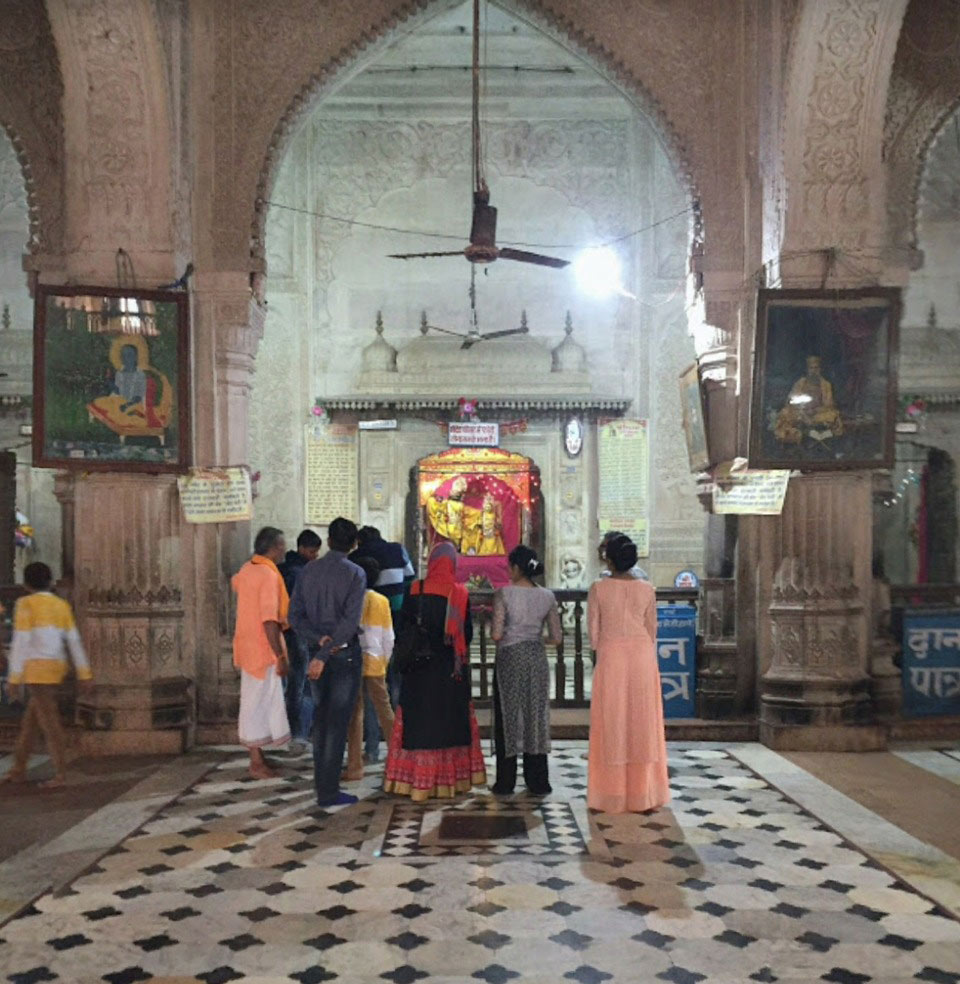
Deeg
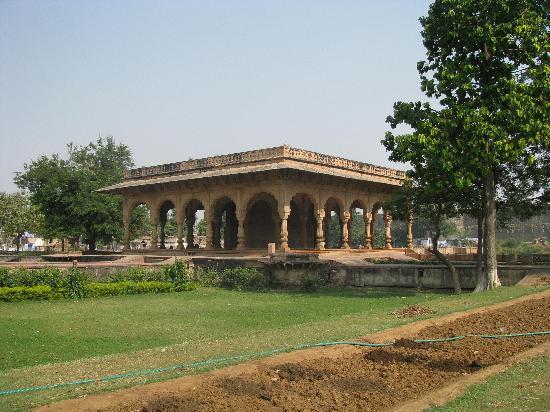
Situated 32 km north-west of Bharatpur on the way to Alwar, Deeg was once the favourite summer resort and second capital of Bharatpur state. As towns go, Deeg is not much of a place, being small and dusty and primarily agricultural. But it has a past worthy of note. Built as a holiday resort by the Jat rulers of Bharatpur, Deeg has a fort with all of twelve bastions. The largest of these, Lakha Burj, is still mounted with a cannon. But more than the fort, Deeg is not to be missed for the excellent sense of balance with which its palaces and gardens have been laid out. The buildings form a large rectangle enclosing a garden and two large tanks at the eastern and western ends.
The largest and most impressive structure is Gopal Bhawan inside which, even on a summer’s day, the air is cool and refreshing. Perhaps the most attractive part of the garden complex is the summer pavilion, Keshav Bhawan. On special occasions the 500 fountains around the pavilion used to spout coloured water while fireworks lit up the night sky. Some of these fountains still play during local festivals.
Nandgaon
Nandgaon (56 km from Mathura) is the place where Lord Krishna is believed to have spent his childhood. Several stories of his childhood are associated with this village. The temple dedicated to Nand Rai, situated atop a hill, is the prime attraction of Nandgaon. It was built by a Jat ruler called Roop Singh. The other temples here are dedicated to Narsingha, Gopinath, Nritya Gopal, Girdhari, Nand Nandan, and Yasodha Nandan. Along with Barsana, Nandgaon has a glorious tradition of Holi. One day before the Holi, women of Barsana visit Nandgaon and challenge the men of this village to play Holi with them. The next day the men of this village go to Barsana to play the famous Lathmar Holi (Holi played with wooden sticks).
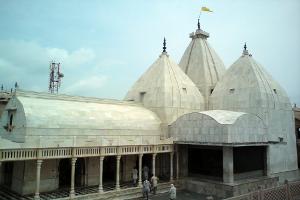
Mahaban
Alwar is at a distance of 116 km from Bharatpur. Though the city is regarded as the gateway to the royal state of Rajasthan, it has a legacy more powerful than that. There are many tourist attractions in the city that reflect the glorious Rajput history of the place. The main attraction of Alwar are the Bala Quila and the City Palace complex. There is a lake beside the City Palace, as well as a government museum and the tomb of Tarang Sultan.
Fact File
 Area: 29 sq. km
Area: 29 sq. km
 Altitude: 250 m above sea level
Altitude: 250 m above sea level
 Best Time to Visit:October to March
Best Time to Visit:October to March
 Languages:Oriya, Hindi, and English
Languages:Oriya, Hindi, and English
 STD Code: 05644
STD Code: 05644




